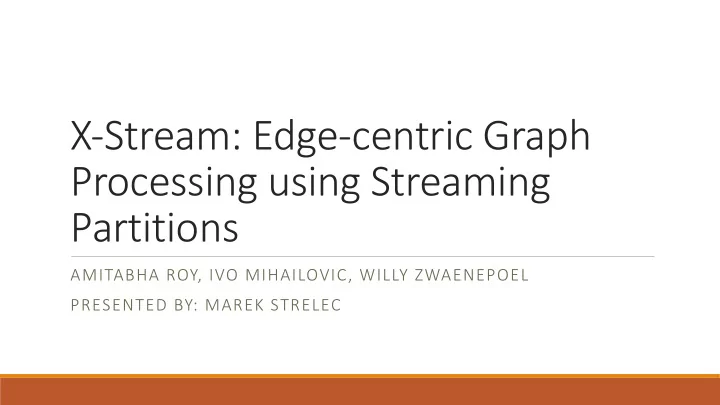

X-Stream: Edge-centric Graph Processing using Streaming Partitions AMITABHA ROY, IVO MIHAILOVIC, WILLY ZWAENEPOEL PRESENTED BY: MAREK STRELEC
Motivation q Large graphs – billions of vertices and edges q Process on large clusters q Pregel, GraphLab, PowerGraph, Niad q Complexity and cost q Process on a single machine q GraphChi, X-Stream q 64 GB RAM, 32 cores, 2 x 200 GB SSD, 3 x 3TB drive
Vertex-centric processing model q “Think like a vertex” q Popularized by the Pregel and GraphLab projects q Mutable states stored in vertices q Scatter-Gather model q Scatter updates along outgoing edges q Gather updates from incoming edges
Vertex-centric BFS
Vertex-centric BFS
Vertex-centric BFS
Vertex-centric BFS
Sequential vs. Random access q Graph traversal = Random access q For all storage media (RAM, SSD, and HDD) q Sequential bandwidth >> random access bandwidth q HDD - 300x higher q SSD - 30x higher q RAM (1 core) - 4.6x higher q RAM (16 cores) - 1.8x higher
X-stream processing model: Edge-centric q Input to X-stream is an unordered set of directed edges q For undirected graphs - pair of directed edges q Scatter and Gather phases iterate over vertices edges q X-stream makes graph access sequential
Edge-centric BFS
Edge-centric BFS
Edge-centric BFS
Edge-centric BFS
Edge-centric properties q Many sequential scans of the edge list q The order of edges is irrelevant q Tradeoff q Sequential access is faster q More Scatter/Gather iterations q The number of iterations might be fever if the edge set >> vertex set q Problem: still have random access to vertex set
Streaming partitions q Partition the graph into streaming partitions q vertex set: a subset of vertices that fit into RAM q edge list: all edges whose source vertex is in the partition’s vertex set q update list: all updates whose destination vertex is in the partition’s vertex set q Streaming partitions can be processed in parallel q Vertices (random access) => fast storage, Edges (sequential access) => slow storage q The number of partitions is crucial for performance q Shuffle phase - updates must be re-arranged after the scatter phase
Scalability q Increasing thread count q Increasing number of I/O devices q Across devices Traversal algorithms – BFS, WCC Multiplication algorithms – PageRank, SpMW
Comparison with Other Systems: Ligra q Ligra q In-memory graph processing system q Requires pre-processing
Comparison with Other Systems: GraphChi q GraphChi q Traditional vertex-centric approach q Out-of-core data structure, parallel sliding windows, to reduce the amount of random access to disk q needs time to pre-sort the graph into shards
Criticism q Assumes that the number of edges is larger than the number of vertices q Performs well only on graphs with a low diameter q Workload imbalance as the partitions can have different numbers of edges assigned to them q Is work stealing sufficient?
Thank you!
Recommend
More recommend